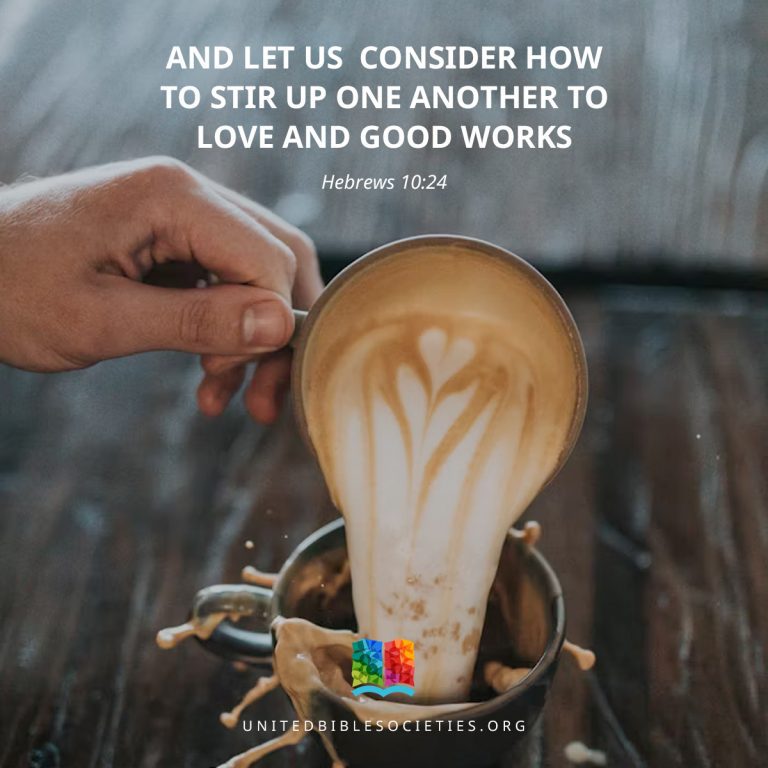1 The Jewish Law is not a full and faithful model of the real things; it is only a faint outline of the good things to come. The same sacrifices are offered forever, year after year. How can the Law, then, by means of these sacrifices make perfect the people who come to God? 2 If the people worshiping God had really been purified from their sins, they would not feel guilty of sin any more, and all sacrifices would stop. 3 As it is, however, the sacrifices serve year after year to remind people of their sins. 4 For the blood of bulls and goats can never take away sins.
5 For this reason, when Christ was about to come into the world, he said to God:
“You do not want sacrifices and offerings,
but you have prepared a body for me.
6 You are not pleased with animals burned whole on the altar
or with sacrifices to take away sins.
7 Then I said, ‘Here I am,
to do your will, O God,
just as it is written of me in the book of the Law.’”
8 First he said, “You neither want nor are you pleased with sacrifices and offerings or with animals burned on the altar and the sacrifices to take away sins.” He said this even though all these sacrifices are offered according to the Law. 9 Then he said, “Here I am, O God, to do your will.” So God does away with all the old sacrifices and puts the sacrifice of Christ in their place. 10 Because Jesus Christ did what God wanted him to do, we are all purified from sin by the offering that he made of his own body once and for all.
11 Every Jewish priest performs his services every day and offers the same sacrifices many times; but these sacrifices can never take away sins. 12 Christ, however, offered one sacrifice for sins, an offering that is effective forever, and then he sat down at the right side of God. 13 There he now waits until God puts his enemies as a footstool under his feet. 14 With one sacrifice, then, he has made perfect forever those who are purified from sin.
15 And the Holy Spirit also gives us his witness. First he says,
16 “This is the covenant that I will make with them
in the days to come, says the Lord:
I will put my laws in their hearts
and write them on their minds.”
17 And then he says, “I will not remember their sins and evil deeds any longer.” 18 So when these have been forgiven, an offering to take away sins is no longer needed.
Let Us Come Near to God

19 We have, then, my friends, complete freedom to go into the Most Holy Place by means of the death of Jesus. 20 He opened for us a new way, a living way, through the curtain—that is, through his own body. 21 We have a great priest in charge of the house of God. 22 So let us come near to God with a sincere heart and a sure faith, with hearts that have been purified from a guilty conscience and with bodies washed with clean water. 23 Let us hold on firmly to the hope we profess, because we can trust God to keep his promise. 24 Let us be concerned for one another, to help one another to show love and to do good. 25 Let us not give up the habit of meeting together, as some are doing. Instead, let us encourage one another all the more, since you see that the Day of the Lord is coming nearer.
26 For there is no longer any sacrifice that will take away sins if we purposely go on sinning after the truth has been made known to us. 27 Instead, all that is left is to wait in fear for the coming Judgment and the fierce fire which will destroy those who oppose God! 28 Anyone who disobeys the Law of Moses is put to death without any mercy when judged guilty from the evidence of two or more witnesses. 29 What, then, of those who despise the Son of God? who treat as a cheap thing the blood of God's covenant which purified them from sin? who insult the Spirit of grace? Just think how much worse is the punishment they will deserve! 30 For we know who said, “I will take revenge, I will repay”; and who also said, “The Lord will judge his people.” 31 It is a terrifying thing to fall into the hands of the living God!
32 Remember how it was with you in the past. In those days, after God's light had shone on you, you suffered many things, yet were not defeated by the struggle. 33 You were at times publicly insulted and mistreated, and at other times you were ready to join those who were being treated in this way. 34 You shared the sufferings of prisoners, and when all your belongings were seized, you endured your loss gladly, because you knew that you still possessed something much better, which would last forever. 35 Do not lose your courage, then, because it brings with it a great reward. 36 You need to be patient, in order to do the will of God and receive what he promises. 37 For, as the scripture says,
“Just a little while longer,
and he who is coming will come;
he will not delay.
38 My righteous people, however, will believe and live;
but if any of them turns back,
I will not be pleased with them.”
39 We are not people who turn back and are lost. Instead, we have faith and are saved.
1 Ŋen ŋanṯa alganun yerṯo usila gəŋen ŋəŋəra ikərəŋ iŋi ŋid̶i aŋela na gerṯe sura d̶urri, yënəŋu yaber yeɽwad̶aṯa yibəd̶ia led̶a ṯa aləɽiñəd̶eini kwai kwai, ildi leṯo ṯa aləbuŋṯi Rəmwa, d̶əɽəd̶əniad̶a id̶i d̶ənaneid̶ənia nṯəlia pred̶. 2 Ndə led̶a ildi labuŋṯia Rəmwa lid̶ənu ləɽiñəd̶einu ṯa d̶əneid̶ənia d̶əd̶əɽəd̶ənia d̶aməndëd̶ənu, ŋen ŋanṯa gəbanṯa led̶a ildi lananaid̶o d̶əd̶əɽəd̶ənia lid̶ənu ləɽiñəd̶einu ṯa alerṯe lid̶i aləŋəd̶eini eŋen ŋeicia məldin. 3 Orn eŋen ŋəd̶əɽəd̶ənia id̶i led̶a ləlëldəŋəd̶einia eŋen ŋeicia nṯəlia pred̶, 4 ŋen ŋanṯa ŋəfəni ŋəñənḏəri na ŋəñwad̶o ŋaber ŋəɽwad̶aṯa ŋəŋgeicia ŋen ŋeicia.
5 Ŋen ŋafəṯia ndə Almasiya geṯo alo gënəŋu gaṯa ṯa,
“Agero agwonaṯa d̶əɽəd̶ənia na d̶əneid̶ənia,
orn agatoɽaṯa aŋəno ŋen ŋanṯa ñi.
6 Đənaneid̶ənia d̶əd̶wala d̶uɽənu na d̶əɽəd̶ənia ŋen ŋanṯa ŋen ŋeicia laŋge ildi lero ləŋid̶ia agəŋəra nano.
7 Oro egaṯa ṯa, ‘Seid̶u, egeṯo ṯa yid̶i ŋen agwonaṯa ya Rəmwa’,
ŋen ŋarno ŋen ŋəwërd̶ənu egad̶am gəlaɽəŋa ŋen ŋanṯa ñi.”
8 Ananoŋ gënəŋu gaṯa ṯa, “Agero agwonaṯa d̶əɽəd̶ənia na d̶əneid̶ənia na d̶əneid̶ənia d̶əd̶wala d̶uɽənu na d̶əɽəd̶ənia ŋen ŋanṯa ŋen ŋeicia na laŋge ildi lero ləŋid̶ia agəŋəra nano.” (Laŋge ildi lananeid̶ənu eŋen ŋalganun.) 9 Oro nḏurṯu alo naŋaṯa ṯa, “Seid̶u, egeṯo ṯa yid̶i ŋen agwonaṯa.” Nṯia gënəŋu gaŋgeicu ŋen ŋananoŋ ṯa ŋen ŋənḏurṯu aŋərraṯe eŋen iŋi. 10 Na ŋenŋa iŋi Rəmwa rafo rwonaṯa ṯa nëndr alid̶ənr ləgətəɽr d̶əneid̶əniad̶a d̶aŋəno yi-Yesu Almasiya lomanto d̶əge.
11 Na kana pred̶ yaṯurwa iŋəmëɽria eŋen ñoman pred̶, yananaid̶ia d̶əɽəd̶ənia id̶i d̶əber d̶əməlëd̶ənia id̶i d̶əber d̶əɽwad̶aṯa d̶əŋgeicia ŋen ŋeicia kwai kwai. 12 Orn ndə Almasiya gənaid̶o d̶əɽəd̶ənia d̶onto d̶əbəɽəbəte ŋen ŋanṯa ŋen ŋeicia, gënəŋu gaɽaŋo alo nḏəŋ d̶əŋaicəba d̶ə-Rəmwa, 13 ṯa aŋəṯurṯi led̶a ildi ləmageiya alɽeṯe waŋge gərəmanəŋ rəlëɽəŋu. 14 Ŋen ŋanṯa d̶əneid̶əniad̶a d̶onto gënəŋu gid̶u led̶a ildi ləbəd̶ənia ltəɽe ṯa ləɽiñəd̶einu bəɽəbəte. 15 Na com Usila Gətəɽe gaɽo d̶aməd̶aṯa id̶ëndr eŋen iŋi, ŋen ŋanṯa galwaɽo ananoŋ ṯa,
16 Eləŋ Rəmwa raṯa ṯa,
“Fəd̶ərreid̶ia eŋen id̶i igid̶i ñid̶əlda nḏurṯu alo.
Igid̶i yëɽi alganun ilëɽəñi enare enen,
na igid̶i eləwërd̶eici eŋəṯəɽa eŋen.”
17 Orn ralwaɽo nḏurṯu ṯa,
“Egaber igid̶i yilëldəŋəd̶eini eŋen eŋen ŋeicia,
na eŋen eŋen ŋəfo mənna təŋ kwai kwai.”
18 Nṯia ndə ŋen ŋeicia na ŋen ŋəfo mənna ŋəŋgeinu d̶əge, d̶əɽəd̶ənia ŋen ŋanṯa ŋen ŋeicia d̶ero d̶əfia məldin.
Aljomaṯr Rəmwa nano ṯwaiñ
19 Lorldaiñ, nëndr ləgaɽwad̶aṯar ləgəbënṯiar alo isi yed̶eṯəm isi yid̶əñinu yetəɽe yeməñaṯo lorəba pred̶ d̶ëɽəniad̶a d̶əñano eŋen ŋəŋəfəni ŋə-Yesu, 20 ed̶ad̶ id̶i d̶əmaijən na d̶erṯo d̶əməṯiano id̶i gënəŋu giṯəndr egeren, fəŋu aŋəno ilëɽəŋu, 21 na ləgerṯr eləŋ gəkana igi goɽra gəŋəra na gerṯo ŋələŋe egeɽa gə-Rəmwa. 22 Ŋen ŋafəṯia aljomaṯr Rəmwa nano narna nəd̶urwaṯo eŋen na d̶wonaṯad̶a d̶əɽiñəd̶einu na narna nid̶ənu nətəɽe id̶əskinia d̶əŋen ŋeicia, na aŋənoyia ywasənu ŋawaŋa ŋətəɽe. 23 Alëndr kaiñ d̶əɽwala eŋen iŋi ləgəṯurṯiar, d̶ətësənia d̶ero, ŋen ŋanṯa rënəŋu irri rëɽu ŋen rad̶urwaṯo eŋen. 24 Aɽrəmoṯr ŋen ṯa alaməd̶aid̶r ṯa alibwid̶r na alid̶r ŋəmëɽria ŋəŋəra. 25 Alerṯr ləgəŋgiṯiar ŋen ŋəd̶ərarraid̶ia, garno led̶a ləmaṯan ləbəd̶ia ṯia, orn alonḏeiced̶r bəɽan kaiñ, ŋen ŋanṯa ñagaseicia loman lakəl l-Eləŋ lafo ṯwaiñ.
26 Ndə ləgəŋënṯr d̶ələŋeṯa d̶əŋen ŋəd̶eṯəm, oro ṯalid̶r ŋen ŋeicia, d̶əɽəd̶ənia d̶ero d̶əɽwad̶aṯa d̶əŋgeicia ŋen iŋëndr ŋeicia məldin, 27 orn ləgerṯr d̶akəmia id̶i d̶id̶i ad̶ela na d̶eiciano id̶i d̶id̶i ad̶əməndad̶e led̶a ildi ləgeiya Rəmwa ŋen ŋarno isia. 28 Ed̶a igi gəgera alganun yi-Musa gënəŋu gaɽiñənia ŋəbaiya ŋero ndə led̶a ləɽijan walla liɽijin ləɽo d̶aməd̶aṯa eŋen. 29 Đakəmia d̶aɽo d̶oɽra kaiñ d̶ed̶a igi gərldəd̶aṯa Id̶ia gə-Rəmwa alo na igi gəd̶ama ŋəfəni ŋəd̶ərreid̶ia eŋen nəŋaṯa ŋəfəni iŋi ŋətaŋa iŋi gënəŋu gid̶əniya gətəɽe, na igi gəd̶aməco Usila Gətəɽe eŋen igi gənanaid̶ia d̶ənaica məɽəməɽeñ d̶ə-Rəmwa? 30 Ŋen ŋanṯa ləgaləŋeṯr Rəmwa irri raṯa, “Đərria ŋen orəba d̶alëɽəñi, igid̶i yikuɽəbiṯi led̶a d̶əpəɽa.” Na irri raṯa təŋ, “Eləŋ Rəmwa rid̶i arakəme led̶a əllëɽəŋu.” 31 Ŋen ŋaɽo ŋəd̶aiña ŋoɽra kaiñ ṯa ŋiɽəṯi ed̶əŋ d̶ə-Rəmwa irri rəməṯo.
32 Orn lëldəŋəd̶einr eñoman ñananoŋ ndə ñagëndu ŋen ŋə-Rəmwa na ñagaɽiñaṯa ŋen ŋubwa ŋeicia ŋinia iŋi ñagənaneinu, 33 liga ñagəd̶aməcənu ŋen na ñagananeinu ŋen ŋubwa ŋeicia led̶a nëiñua, na liga ñagəfo ñagəɽaŋa led̶ala ildi lənanemu ŋen iŋi ŋeicia. 34 Ŋen ŋanṯa ñaŋ ñagagiyaca led̶a ŋəbaiya nano ildi lëndənu isijən na ñagəŋënṯu ŋen d̶əŋərad̶a nano ndə led̶a ləmamo laŋge pred̶ eldalo, ŋen ŋanṯa ñagaləŋeṯo ṯa ñagerṯo laŋge ləŋəra kaiñ ləməñaṯo laŋge ildi ləmamənu, ildi lid̶i aləfeṯe bəɽəbəte. 35 Ŋen ŋafəṯia ñerṯe ñaŋgiṯia d̶ëɽənia d̶əñano ed̶alo id̶i d̶id̶i ad̶əmame d̶əpəɽa d̶əŋəra d̶oɽra. 36 Ŋen ŋanṯa ŋen d̶eṯəm ṯa ñagaɽiñaṯa ŋen, ṯa ñid̶i ŋen iŋi Rəmwa rwonaṯa na ṯa ñaneini ŋen rënəŋu rëɽəṯu led̶a əllëɽəŋu.
37 “Na iliga ltëfr, gënəŋu gid̶i aŋela, d̶eṯəm gid̶i aŋela na gaber gid̶i aŋəd̶uri.
38 Orn ed̶a gəlëɽəñi igi gəd̶urwaṯo eŋen gid̶i aŋəməṯe d̶wonaṯad̶a,
na ndə gënəŋu goɽəbaṯo nḏurṯu,
ara gəlëɽəñi gaber gəŋəra nano iŋu.”
39 Orn nëndr ləgertar ləgəled̶ar ildi lokoɽəbaṯa nḏurṯu ildi ləməndëd̶ənia, orn ləgəled̶ar ildi lerṯo d̶wonaṯa, nṯia nusila inëndr nëbərnia.

